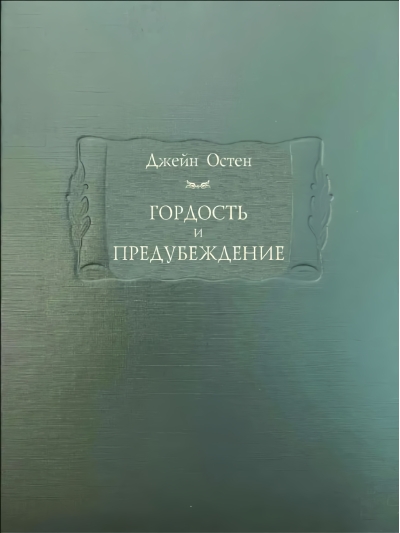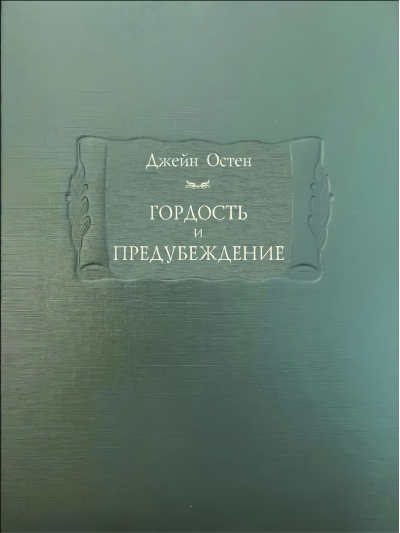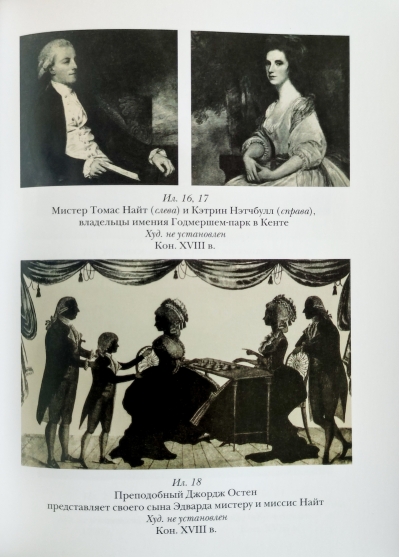Pride and Prejudice
49.99 €
The only thing available 1
"Pride and Prejudice" (1813) Jane Austen (1775-1817) - one of the most popular novels in the history of English literature, attracting for two centuries, not only millions of fans, but also serves as an object of close attention of the widest range of researchers - from literary scholars to historians of feminism and revolutionary ideas. J. Austen is not just a wonderfully gifted writer, vivaciously and easily mastered the language, the creator of sparkling reprises and subtle psychological portraits, she - a remarkable reformer of the genre of the novel, the first connoisseur of her work was Walter Scott himself, and J.-G. Lewis called her "Shakespeare of prose". In the XX century formed a real "cult" of J. Austen, and she was talked about as the first of the great English-language writers.
Excellent moralist and a fan of the comedy genre, Austen makes interesting and saturated with the seemingly serene life of the English province, and so that the novel reveals the hidden sides of human nature, reveals the depth of feelings, usually hidden from prying eyes. She has no equal in analyzing the impact of society on people, especially young lovers. In "Pride and Prejudice" wittiest woven "gothic", "family and domestic" and "sentimental" genres, forming an amazing narrative mosaic, firmly holding the reader's attention and anticipating, as well as other wonderful creations of the "incomparable Jane", the best novels of XX and XXI centuries, including the most popular "family sagas". Previously, the novel "Pride and Prejudice" has already been published in Russian in three professional translations (the first of them, I. Marshak, saw the light in 1967 in the series "Literary Monuments"). Unfortunately, all of them are far from the level of perfection deserved by the discerning Russian book lover who expects to meet the immortal novel. Especially for this edition, A.Y. Livergant, one of the coryphees of the national school of translation, has made a new and undoubtedly the best translation of the novel. The style is congenial: instead of the traditional "lengths", to which our readers are accustomed in previous translations, he is waiting for sparkling, sparkling syllables, witty dialogues, lively lines - as in the best comedies of that time (not without reason Austen loved W. Congreve and R.-B. Sheridan so much!). The section "Supplements" includes the best juvenile works of Austen. Among them - novels in letters "Lady Susan" and "Leslie Castle", as well as "Love and Friendship" - a confession of a promiscuous woman with picaresque features, a novel in miniature, which was admired by such an aesthete as G.-K. Chesterton. For the first time translated mock miniatures ("Letter to a Young Lady," "Journey through Wales" and "Beautiful Cassandra") and the only play Austen - a comedy "Sir Charles Grandison", wittily "accommodate" all eight volumes of the huge Richardsonian novel. Of particular interest are the responses to Austen's work by other English authors, her contemporaries and followers - W. Scott, G.-K. Chesterton, W. Wolfe. An extensive scientific apparatus will enrich the reading of all these works. The section "Appendices" includes articles that give a panoramic view of Austen, first of all her biography, written by A.J. Livergant - a brilliant essay, not inferior in vividness and richness of the syllable of her best works. Other articles show different sides of her personality: Osten, rooted in the Age of Enlightenment and tirelessly polemicizing with it (K.N. Atarova); Osten "in a bad world", in the context of romantic ideas of the 19th century, Kantian ethics, etc. (A.Y. Zinoviev). (A.Y. Zinovieva); finally, "Austen and the Screen" - the history of the film incarnations of her novels, for the first time so comprehensively covered in Russian (P.Y. Rybina). A detailed commentary, which not only highlights the realities of the era and the hidden contexts of Austen's narrative, but also describes from different angles the social, domestic and family life of the early 19th century - as if an invitation to a journey through the bygone, but so alluring Austen's world.
Excellent moralist and a fan of the comedy genre, Austen makes interesting and saturated with the seemingly serene life of the English province, and so that the novel reveals the hidden sides of human nature, reveals the depth of feelings, usually hidden from prying eyes. She has no equal in analyzing the impact of society on people, especially young lovers. In "Pride and Prejudice" wittiest woven "gothic", "family and domestic" and "sentimental" genres, forming an amazing narrative mosaic, firmly holding the reader's attention and anticipating, as well as other wonderful creations of the "incomparable Jane", the best novels of XX and XXI centuries, including the most popular "family sagas". Previously, the novel "Pride and Prejudice" has already been published in Russian in three professional translations (the first of them, I. Marshak, saw the light in 1967 in the series "Literary Monuments"). Unfortunately, all of them are far from the level of perfection deserved by the discerning Russian book lover who expects to meet the immortal novel. Especially for this edition, A.Y. Livergant, one of the coryphees of the national school of translation, has made a new and undoubtedly the best translation of the novel. The style is congenial: instead of the traditional "lengths", to which our readers are accustomed in previous translations, he is waiting for sparkling, sparkling syllables, witty dialogues, lively lines - as in the best comedies of that time (not without reason Austen loved W. Congreve and R.-B. Sheridan so much!). The section "Supplements" includes the best juvenile works of Austen. Among them - novels in letters "Lady Susan" and "Leslie Castle", as well as "Love and Friendship" - a confession of a promiscuous woman with picaresque features, a novel in miniature, which was admired by such an aesthete as G.-K. Chesterton. For the first time translated mock miniatures ("Letter to a Young Lady," "Journey through Wales" and "Beautiful Cassandra") and the only play Austen - a comedy "Sir Charles Grandison", wittily "accommodate" all eight volumes of the huge Richardsonian novel. Of particular interest are the responses to Austen's work by other English authors, her contemporaries and followers - W. Scott, G.-K. Chesterton, W. Wolfe. An extensive scientific apparatus will enrich the reading of all these works. The section "Appendices" includes articles that give a panoramic view of Austen, first of all her biography, written by A.J. Livergant - a brilliant essay, not inferior in vividness and richness of the syllable of her best works. Other articles show different sides of her personality: Osten, rooted in the Age of Enlightenment and tirelessly polemicizing with it (K.N. Atarova); Osten "in a bad world", in the context of romantic ideas of the 19th century, Kantian ethics, etc. (A.Y. Zinoviev). (A.Y. Zinovieva); finally, "Austen and the Screen" - the history of the film incarnations of her novels, for the first time so comprehensively covered in Russian (P.Y. Rybina). A detailed commentary, which not only highlights the realities of the era and the hidden contexts of Austen's narrative, but also describes from different angles the social, domestic and family life of the early 19th century - as if an invitation to a journey through the bygone, but so alluring Austen's world.
See also:
- All books by the publisher
- All books by the author
- All books in the series Literary monuments













